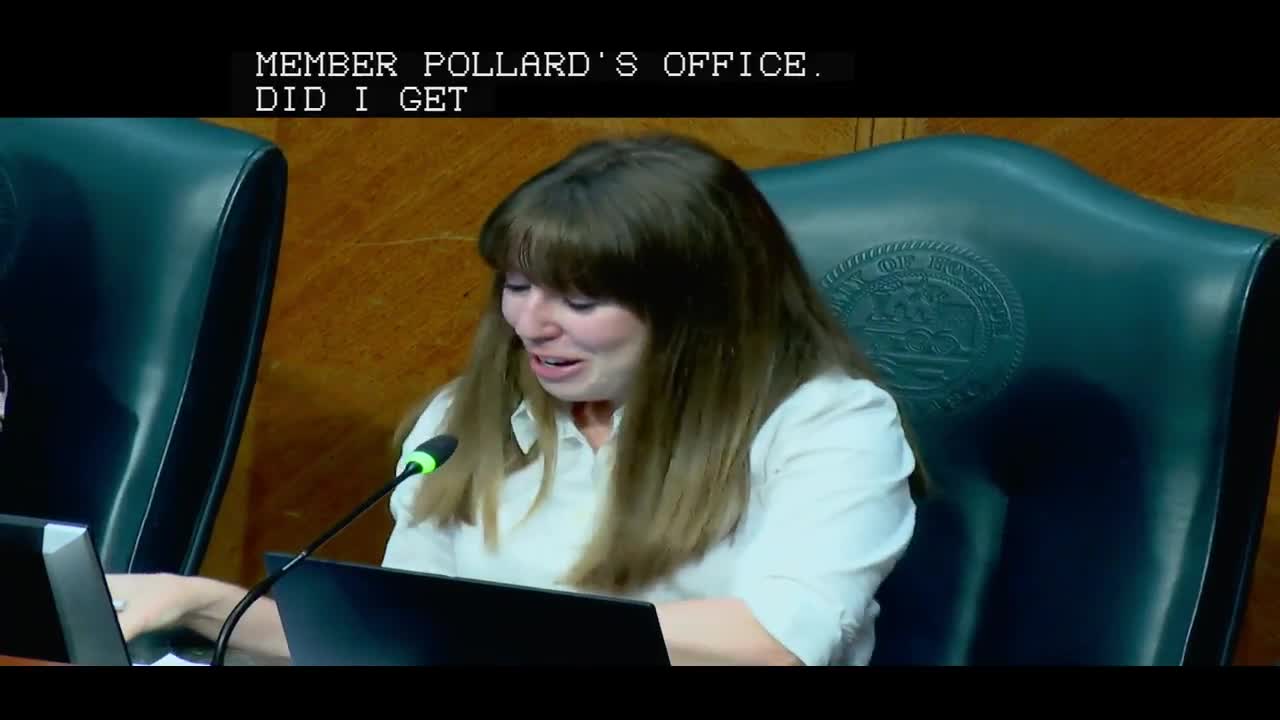HPD outlines new state laws, $10 million equipment appropriation and impacts for Houston policing
Get AI-powered insights, summaries, and transcripts
Subscribe
Summary
Houston Police Department leaders briefed the council committee on more than 180 new laws tracked this session, highlighted a $10 million state appropriation for local law enforcement equipment, and described operational and mental‑health impacts for HPD.
Jessica Anderson, executive assistant chief of the Houston Police Department, told the City Council Public Safety Committee on Oct. 15 that HPD tracked roughly 1,400 bills this legislative session and that about 180 of those measures passed into law.
Anderson said HPD’s legislative team works alongside the City’s intergovernmental relations staff to review bills before, during and after the session, supply subject‑matter expertise to state lawmakers, and raise concerns about proposals that could adversely affect department operations.
The department highlighted a subset of enacted measures it believes will affect Houston policing. Among the items noted were House Bill 33 (the “Uvalde Strong” measure) requiring standardized active‑shooter training and post‑incident responsibilities for school districts and school law‑enforcement; House Bill 1261, which modernizes publication requirements for abandoned or unclaimed property by allowing online notice in lieu of newspaper publication; and House Bill 1902, which creates a penal code offense addressing “jugging,” a form of predatory theft HPD said has spread beyond Houston.
Anderson and Lieutenant Nathan Carroll described several other laws they said have direct operational impact. Senate Bill 1 (the state budget) included a $10,000,000 appropriation the department expects will be available for local law‑enforcement equipment and fleet modernization. Carroll said that appropriation, which council members connected to item 39 on the city agenda, would allow purchase of about 166 vehicles that HPD does not currently have and will therefore increase deployable units rather than merely replace an equal number of vehicles. Anderson said the department is working to replace aging units that remain in use so officers can remain mobile across the city.
Other laws summarized by HPD staff included Senate Bill 482, which creates a third‑degree felony when an assault targets an on‑duty utility worker and a related class‑B offense for interference with utility employees; Senate Bill 1164 (as referenced in the presentation), which expanded emergency‑detention criteria and added “anosognosia” — lack of awareness of one’s mental illness — to the factors for assessing risk and detention; and Senate Bill 1646, which addressed copper and brass theft and restricted resale of such material to licensed metal recyclers. HPD also highlighted legislation to phase out paper temporary dealer license plates (related to House Bill 718 and Senate Bill 1902) and a statute increasing penalties for drivers who discharge firearms in road‑rage incidents (Senate Bill 3031).
Carroll said the emergency‑detention changes permit officers to return to service after delivering a person subject to an emergency detention order to a receiving facility without waiting for a medical screening at that hospital, a change HPD views as operationally important. Anderson noted the mental‑health division will give a fuller presentation to the committee next month.
Council member Ramirez asked whether the $10 million appropriation tied to the state budget would produce a net gain in vehicles; Anderson said HPD expects a gain of 166 vehicles beyond the department’s current deployable fleet. Ramirez and Anderson also discussed recruiting and retention: Anderson said a recently approved police contract and a “drop‑back” provision have increased recruitment interest and reduced retirements; she cited a classified employee count “over 5,300,” the department’s highest in recent years.
On mental‑health response, Anderson and Carroll told the committee that the loss of ARPA funding required reevaluation of some projects (including discontinued use of a particular “core tablet” system) but that HPD does not expect the ARPA reductions to significantly interrupt current mental‑health response. They said bed capacity at local facilities such as the Ben Taub neuropsychiatric center has expanded recently and that additional funding and bed space would be helpful.
Anderson emphasized that the department’s legislative role is collateral to their regular assignments and consists of monitoring bills, advising lawmakers, and coordinating testimony by HPD subject‑matter experts. She thanked the city’s intergovernmental relations staff for coordination and said HPD will continue monitoring implementation and unintended consequences as laws take effect.
The committee did not record a formal vote on any of the bills discussed; several members asked for follow‑up briefings on specific operational impacts, and HPD committed to provide more detail, including a separate mental‑health division presentation next month.
